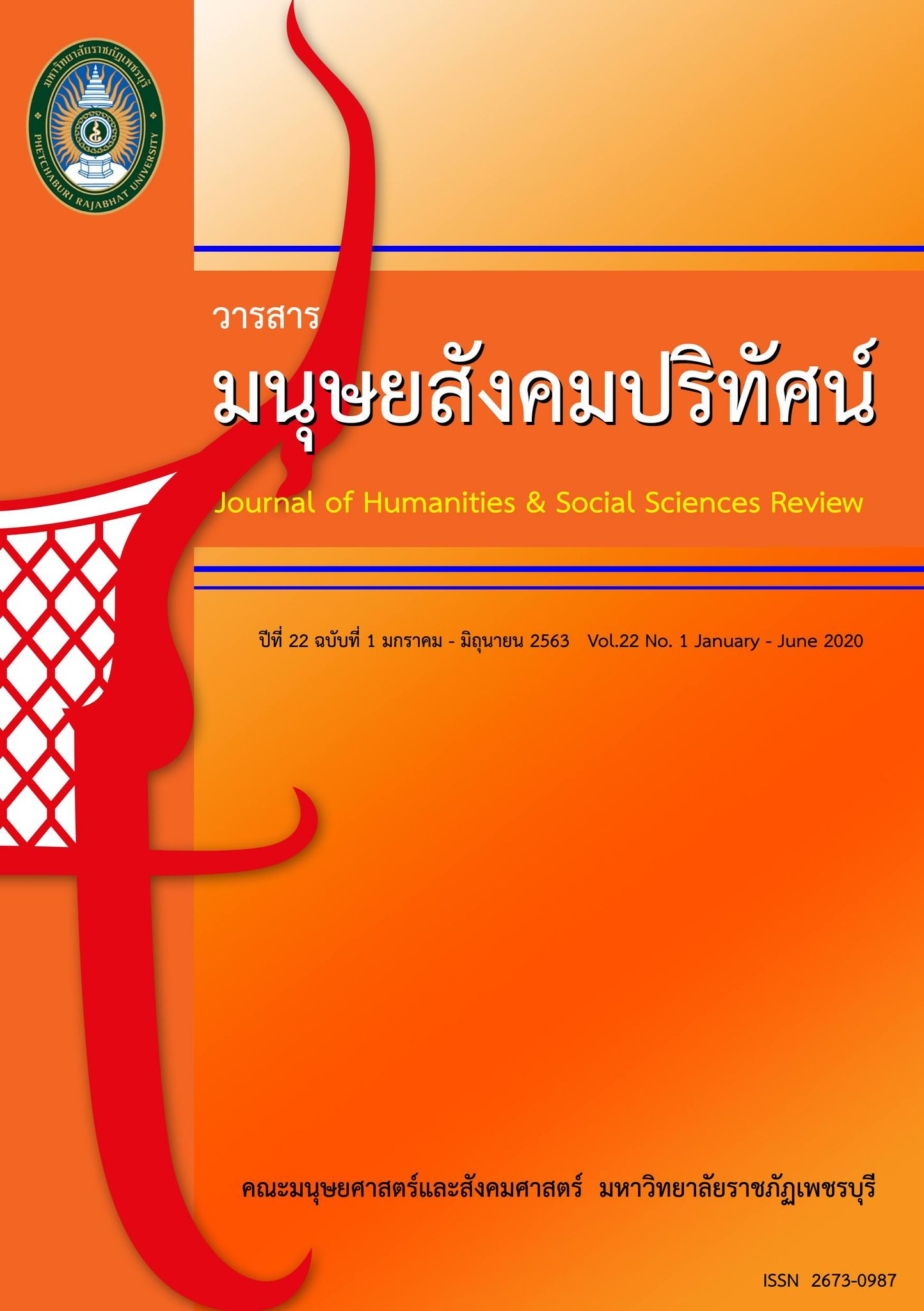การพัฒนาศักยภาพการท่องเที่ยวชุมชน: กรณีศึกษาชุมชนหนองจอก จังหวัดเพชรบุรี
Main Article Content
บทคัดย่อ
การวิจัยนี้มีวัตถุประสงค์เพื่อ 1) ศึกษาศักยภาพทางการท่องเที่ยวของชุมชนหนองจอก ตำบลหนองจอก อำเภอท่ายาง จังหวัดเพชรบุรี และ 2) ศึกษาแนวทางการพัฒนาศักยภาพด้านการท่องเที่ยว ของชุมชนหนองจอก ตำบลหนองจอก อำเภอท่ายาง จังหวัดเพชรบุรี สู่การปฏิบัติจริง โดยใช้วิธีดำเนินการวิจัยเชิงคุณภาพและปริมาณ คือ การสัมภาษณ์ กลุ่มนักท่องเที่ยว กลุ่มตัวอย่างในพื้นที่ กลุ่มภาครัฐ นักวิชาการ และกลุ่มภาคเอกชน รวม 40 คน และเก็บข้อมูลแบบสอบถามจากชุมชนหนองจอก จำนวน 438 ชุด เพื่อหาข้อมูลด้านศักยภาพทางการท่องเที่ยวของตำบลหนองจอก ผลการวิจัยพบว่า ชุมชนมีศักยภาพในการพัฒนาการท่องเที่ยวในชุมชนหนองจอกทั้ง 7 ด้าน คือ 1) ด้านทรัพยากรการท่องเที่ยว 2) ด้านสิ่งอำนวยความสะดวก 3) ด้านความสามารถในการเข้าถึง 4) ด้านกิจกรรม 5) ด้านที่พัก 6) ด้านทรัพยากรบุคคลสำหรับการท่องเที่ยว และ 7) ด้านการส่งเสริมการท่องเที่ยว ส่วนความคิดเห็นเกี่ยวกับศักยภาพของแหล่งท่องเที่ยว ทุกด้านอยู่ในระดับปานกลาง (ค่าเฉลี่ย= 3.26) โดยเมื่อแยกพิจารณาเป็นรายด้านพบว่า มี 3 ด้าน ที่มีความความคิดเห็นอยู่ในระดับมาก ได้แก่ ด้านภูมิปัญญาชาวบ้านที่เป็นเอกลักษณ์จูงใจให้เดินทางมาเที่ยว (ค่าเฉลี่ย= 4.13) ด้านสถานที่และประเพณีที่ดึงดูดใจนักท่องเที่ยว (ค่าเฉลี่ย= 4.01) และด้านทรัพยากรธรรมชาติที่สามารถผลิตเป็นภูมิปัญญาของชุมชน (ค่าเฉลี่ย=3.84) รองลงมาเป็นด้านสิ่งอำนวยความสะดวกและการเข้าถึงมีระดับความคิดเห็นอยู่ในระดับปานกลาง (ค่าเฉลี่ย=3.14) ส่วนด้านมีความคิดเห็นอยู่ในระดับน้อย ได้แก่ ด้านทรัพยากรการท่องเที่ยว (ค่าเฉลี่ย=2.99) ด้านการส่งเสริมการท่องเที่ยว (ค่าเฉลี่ย=2.44) ด้านกิจกรรม (ค่าเฉลี่ย=2.39) และด้านทรัพยากรบุคคลสำหรับการท่องเที่ยว (ค่าเฉลี่ย=2.34) ตามลำดับ จากการศึกษาศักยภาพจึงทำให้เกิดแผนการพัฒนาชุมชนหนองจอก เพื่อเป็นแนวทางการพัฒนาศักยภาพของชุมชนตามวัตถุประสงค์ที่ 2 เพื่อการกระตุ้นการพัฒนาด้านการท่องเที่ยวในชุมชนมากยิ่งขึ้น
Article Details
1. มุมมองและความคิดเห็นใด ๆ ในบทความเป็นมุมมองของผู้เขียน คณะบรรณาธิการไม่จำเป็นต้องเห็นด้วยกับมุมมองเหล่านั้นและไม่ถือเป็นความรับผิดชอบของคณะบรรณาธิการ ในกรณีที่มีการฟ้องร้องเกี่ยวกับการละเมิดลิขสิทธิ์ ให้ถือเป็นความรับผิดชอบของผู้เขียน แต่เพียงผู้เดียว
2. ลิขสิทธิ์บทความที่เป็นของคณะมนุษยศาสตร์และสังคมศาสตร์ มหาวิทยาลัยราชภัฏเพชรบุรีมีลิขสิทธิ์ถูกต้องตามกฎหมาย การเผยแพร่จะต้องได้รับอนุญาตโดยตรงจากผู้เขียนและมหาวิทยาลัยราชภัฏเพชรบุรีเป็นลายลักษณ์อักษร
เอกสารอ้างอิง
กนกรัตน์ ดวงพิกุล และจารุนันท์ เมธะพันธุ์. (2561). โฮมสเตย์กับการจัดการท่องเที่ยวอย่างยั่งยืนในจังหวัดน่าน. วารสารบัณฑิตวิจัย Journal of Graduate Research, 9(1), 217-234.
กรมการท่องเที่ยว. (2558). ความสำคัญของอุตสาหกรรมการท่องเที่ยว. กรุงเทพฯ: กองนโยบายและแผน การท่องเที่ยวแห่งประเทศไทย.
การท่องเที่ยวแห่งประเทศไทย. (2551). เที่ยวให้รู้เปิดประตูสมอง. กรุงเทพฯ: เอ็กพลอเรอร์ ชาแนล.
การท่องเที่ยวแห่งประเทศไทย. (2556). แนวคิดในการท่องเที่ยว. กรุงเทพฯ: ผู้แต่ง.
จันทร์จิรา สุขบรรจง. (2559). การพัฒนาการท่องเที่ยวอย่างยั่งยืนของหนานมดแดง อำเภอป่าพะยอม จังหวัดพัทลุง. ปริญญาศิลปศาสตรมหาบัณฑิต สาขาการจัดการอุตสาหกรรมการบริการและการท่องเที่ยว บัณฑิตวิทยาลัย มหาวิทยาลัยกรุงเทพ.
สำนักงานจังหวัดเพชรบุรี. (2561). แผนพัฒนาจังหวัดเพชรบุรี 2561-2564. เพชรบุรี: ผู้แต่ง
Chili, N.S. & Ngxongo, N.A. (2017). Challenges to active community involvement in tourism development at Didima Resort: A case study of Umhlwazini community in Bergville. African Journal of Hospitality, Tourism and Leisure, 6(2), 1-15.
Eber, S. (1993). Principles for sustainable tourism. Retrieved November 24, 2019, from https://sites.google.com/site/pntaoffice/hlak-kar-thxng-theiyw-xyang-yangyun.
Yamane, T. (1973). Statistics: An introductory analysis (3rd ed). New York: Harper and Row Publications.


